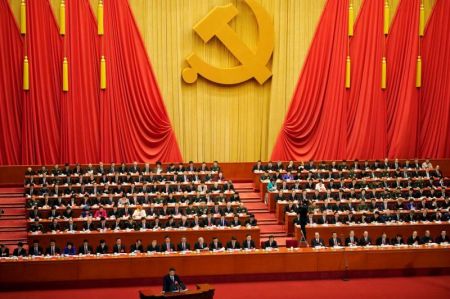Concern for Chinese Christians Grows as President Xi Becomes Most Powerful Since Communist Leader Mao

The concern for persecuted Christians and churches in China is set to grow following the 19th National Party Congress of the Communist Party of China, a watchdog group said, with President Xi Jinping set to rule for years to come.
Bob Fu, president of persecution watchdog China Aid, told The Christian Post in a phone interview on Tuesday that the "clear signal" from the week-long congress, which is held only twice a decade, is that the Communist government will seek to "exert total control over all ares of life" of Chinese citizens, extending to churches and other places of worship.
As Reuters reported on Wednesday, the Communist Party revealed a new leadership line-up without a clear successor to Xi, meaning that he is likely to continue being a top figure even beyond the end of his second term in power in 2022.
Moreover, on Tuesday the party voted to enshrine Xi's name and ideology into its constitution, elevating him to the level of Chairman Mao Zedong, the founder of the People's Republic of China. Fu noted this is the first time this has happened in many decades.
BBC News reported that Xi, who was elected president in 2012, is now "essentially unassailable" due to his strengthened political control over the country, with his power and influence set to last long after his eventual retirement.
Xi laid out his vision for the future during the week-long congress, focusing on leadership and discipline, reform and development, national security, national pride, ideological confidence, and control.
"The party exercises overall leadership over all areas of endeavor in every part of the country," Xi declared, warning that "erroneous" ideology must be opposed.
Fu told CP that concerns over the ongoing crackdown of Christians in the country, some who face accusations of being part of an "evil cult," are only set to increase.
Underground churches have been raided, pastors have been arrested, rooftop crosses have been taken down, and humans rights activists have been harassed and tortured under Xi's leadership, aimed at suppressing the rise of Christianity in the country.
Fu said that some of the concerning rhetoric that stemmed from the congress is the continued objective to "sinicize" religion, meaning to promote and guide religion that is Chinese in orientation.
Zhang Yijiong, the executive deputy head of the United Front Work Department within the Communist Party, pushed for "socialist core values" in the religious community, according to The Diplomat.
Zhang vowed that China will carry on cracking down on acts such as "taking advantage of religion to harm national security," "promoting extremism for terrorist activities," and "endangering national unity."
The China Aid president hit back against China's pretense of using the battle against extremism in order to persecute minorities, however, and said that he has not seen any evidence of such supposed rise in religious extremism.
Fu noted that the Chinese government targets exiled Tibetan spiritual leader the Dalai Lama, considering him to be a dangerous separatist, along with Tibetans who have self-immolated in protest against the government, but noted that that is different from the type of radical extremism more known in the West.
UCANews, a Catholic news source reporting from Asia, noted that Xi is aiming to be China's first dictator since Mao, with Catholics and Christians "holding their collective breaths" in regards to the future.
It warned that Chinese propaganda is lionizing Xi as a "fearless nationalist leader, a strongman who can restore China to its 'rightful place' in the world and particularly the region."
"As well as upgrading Xi's image, there has been the crushing of perceived enemies. These are usually groups or people who simply want to change the system to be more inclusive and look after citizens and their rights, nothing more," it added.
The U.S. State Department's annual International Religious Freedom Report, released earlier this year, called out China for a number of human rights abuses.
It highlighted cases that made world news, such as one incident in April 2016 when the pastor of an unregistered church and his wife were buried alive for trying to save their church from government-ordered demolition, resulting in the wife's death.
Chinese officials pushed back and told the U.S. to back off on its criticism. But Fu said on Tuesday that the Donald Trump administration needs to make clear that "this kind of religious persecution should not be tolerated."
Fu expressed that religious freedom for all "is not only an American value, but a universal value."
He called for the U.S. to refuse "sacrificing our core values" when it comes to deals or trade with the Chinese government.
China Aid pointed to missionary and pastor Yan Xiaojie as one example of the people made to suffer under China's crackdown on religion and dissent.
Yan issued a prayer letter earlier in October ahead of the national congress, sharing how he was targeted for opposing the cross demolition campaign in Zhejiang province in 2015, which led to his arrest at the time.
"In the end, I don't know why [they harass me]? ... [In 2015], they captured me for no reason, and I was shut for half a year in a small, black room. Inside, I was constantly hurt and attacked. I have not exposed them to the world, because they do not allow me to tell about the things that happened inside the prison. I have not yet started to protest and complain ... Do we Chinese people have human rights at all?" the pastor asked in his letter.





















